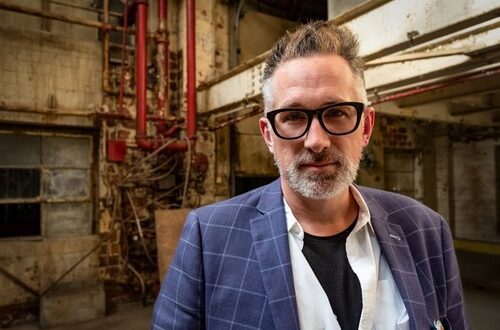I think filmmaker Darren Lynn Bousman (read our other interview with him HERE) is pretty versatile when it comes to his film projects. I mean, this is the guy who gave us four Saw movies (II, III, IV, and Spiral) but also a few cult favorite musicals like Repo! The Genetic Opera, and The Devil’s Carnival and its sequel. He’s done traveling road shows to promote his films and has even dabbled in immersive theater. His latest project, The Cello, is a supernatural horror film about an insidious cello and reunites Darren with his Saw star, Tobin Bell.
Shot on location in Saudi Arabia and mostly in Arabic, The Cello (written by Turki Al Alshikh and based on his book Cello), is a gory slow burn that won’t stop until you’ve heard its death song.
An aspiring cellist learns that the cost of his cello is a lot more insidious than he thought.
To celebrate the release of the film into theaters, I chatted with Darren about how he became involved with the project, filming in Saudi Arabia, creating the film’s music, and more!
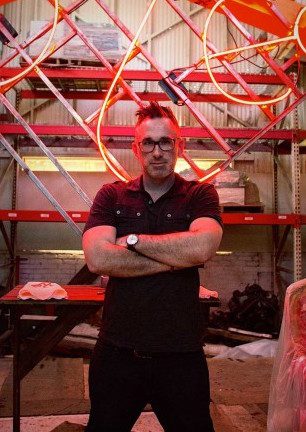
PopHorror: I really enjoyed The Cello. I love how brutal it was and the beautiful scenery. I’m super excited to talk to you about it.
Darren Lynn Bousman: I love it, thank you.
PopHorror: What intrigued you about the script and made you want to be a part of the project?
Darren Lynn Bousman: It’s a multitude of things. I think for me as a filmmaker, it was getting a chance to do something that was dangerous. I think that I was very lucky in my career very early on doing three Saw movies back-to-back-to-back. It was such a comfortable thing for me that ever since then I’ve sought out that adrenaline rush again of doing things that were not safe. I think that some of that not-safeness is going to make a rock opera or going to do immersive theater. So, I’m always looking for, what is the dangerous next step in my career, maybe to the detriment of my family and wife, who wishes I’d probably just go do Saw 47. So, I got the opportunity to go to Egypt originally and meet with this writer who wanted to turn his film or his book into a movie. I’d never been to Egypt so I said I would go meet him and I was kind of immediately… He had this infectious energy. The only thing I could compare it to, if you’ve ever heard Quentin Tarantino talk, he had this very giddy excitement when he talked about movies and he had these obscure references of movies only I thought I’d seen. It started with this friendship forming with this writer, Turki Al Alshikh. Then after about a week and a half of being in Egypt, he said, “Why don’t we go make this movie? I want you to direct it. Let’s go make this movie.” Then he proposed going to Saudi Arabia, which the only thing I know about Saudi Arabia is probably what most of the people know, what I’ve seen on the news or anything like that. There was initial reluctance and then he said, “Just come over there.” He was like, “Just come for 24 hours and see my country.” And I’ve got to tell you, it was the opposite of what I was expecting. I don’t know what I was expecting I guess, but when you get there, it felt like a renaissance taking place where in the years before I arrived, they all of sudden opened up restaurants to everyone meaning coffee shops and restaurants that you could go in and man and woman… That was never allowed there before. Music, never allowed there before. Movies were closed down. Now all of a sudden there were movie theaters everywhere. And there’s art, there’s people on the streets and there’s dancing. That was never allowed there before. It felt infectious. No one felt jaded, which so often you get when you film a movie in Toronto or wherever else, that they film a thousand movies there and there is this kind of, “Oh great, another grip truck, another whatever.” There wasn’t that at all there. There was this excitement, and that excitement went from… Everywhere you walked, it just felt alive and so immediately I was just like, “This is awesome, I’ll do it!” We started putting together a plan on how to do it. We then got Jeremy Irons, and when we got Jeremy Irons, everything else fell into place.
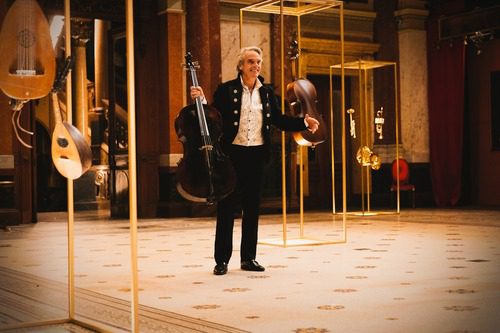
PopHorror: That was one of my questions, what was it like filming on location in Saudi Arabia? While watching this, I was thinking, is that what Saudi Arabia looks like? I had no idea really, what the city there looked like.
Darren Lynn Bousman: I’ll tell you; it was such a weird… What’s the word I’m looking for? The culture shock was something that I can’t even begin to explain because there were nerves going over there because it had been a country that was so closed off. In fact, I can’t think of any movies… Normally, as an audience member, we’re able to transport ourselves. I’ve never been to Italy, but I’ve seen Italy. I’ve never been to all these places, but I watch a movie and like Mission Impossible is there. I think my frame of reference was only what I’ve seen on CNN. That was basically what I thought about it. When you get out of the airport and you’re driving in, it looks like New York. It is highrises and the thing which is crazy is they’re new. These are brand new buildings being built. When we finally got to the hotel and I got outside, outside was the heat. The heat is the big thing that tells you you’re not in Kansas anymore. But you get out, and literally there’s an Urth Caffé directly across from our hotel with the same menu of the Urth Caffé directly across the street from my house right now. Every morning I went to Starbucks. There’s a Starbucks! There’s everything. It’s the same. I think outside of the heat, which was something I was not prepared for, it feels like a country that is now embracing so much culture and art that it just felt like a great place to be and film this movie. Also, we were allowed into places that had never been allowed for filming before. In the movie when they go to AlUla, which is the desert stuff, we were the first film, narrative film, allowed in there. It was such a surreal experience because again, I’m used to shooting in Toronto. Everyone shot the same 40 locations in Toronto a million times. But when you’re going here, we were the first ones to shoot that. The first ones to have a camera on that sand and I’ll tell you this really kind of spiritual moment that I had, which was crazy. We were in the middle of the desert and as far as you can see is sand everywhere. Sand, sand, sand. And we had these guides with us, and I was walking away from the production village and as I’m walking, he goes, “Look out there. What do you see?” And I said, “I see sand.” And he says, “What don’t you see?” And I was trying to figure out what I didn’t see, and he kind of looked down at the sand and I realized there were no footprints anywhere. He says, “Every time that you step foot here, you leave your track for the next sixty years.” Because there’s no wind, there’s no rain, it sits untouched. So, as we’re filming this and we’re looking out at this vast desert, we’re realizing that people haven’t been here, like this was not something that was open to be shot in before. It was a very crazy experience to be able to not only be there, but to be able to witness and see the things we were able to see. The whole experience felt to me like a dream. That’s the only way I can describe it.
PopHorror: That’s super cool.
Darren Lynn Bousman: You know what the craziest thing was? We were filming the desert stuff last. When you’re in the desert there, you have to wear long sleeves because of the sun and the sun will burn you within a minute. So we’re all out there, we’re shooting this thing and it’s hot, but we have to rush because we were filming in Prague 48 hours later. So, we had to fly from Saudi Arabia to Prague, and that night in Prague it was below freezing. To go from the hottest I’ve ever felt in my life to the coldest I’ve ever been, just again one of those strange things that only ever happens making movies like this.
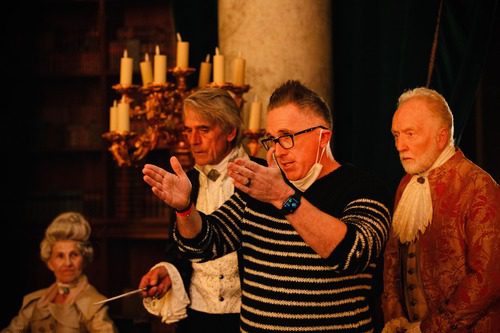
PopHorror: Give me the cold over the heat any day. How challenging was it for you to direct a film that isn’t in your native language?
Darren Lynn Bousman: I think you’ve got to approach things so differently. I’ve been very lucky. I’ve shot all over the world. I’ve been able to film a movie in Spain and we worked with Spanish actors, and I went to Thailand and shot it in Thai. A little thing that a lot of people haven’t seen I did is I shot a Japanese TV series called Crow’s Blood, six episodes all in Japanese, not a single word of English.
PopHorror: Oh wow!
Darren Lynn Bousman: It goes with that idea of wanting to be challenged, I think. Also wanting to learn from other cultures on how to do things. I think that a lot of times we get so set in our ways like, this is the way you do it, this is the way you put the camera, this is the way that you… The thing that was kind of interesting about Saudi was that everyone spoke English. When I was in Japan, we had translators. I had three translators around me trying to explain what I wanted. There was never an issue in Riyadh trying to convey what we wanted. All the actors spoke English so what we did was we would rehearse in English, and after we rehearsed in English we would give it to them to say back in Arabic. The challenge was presented by the cultural and regional norms, things that we might do that are foreign to them. The example that comes to mind is the idea of mourning. I had an English script that I worked off of and they had an Arabic script. You would look at something that in an English script might be two paragraphs in length, but when they would say it, it’s four words. And I’d be like, “No, no, no. It says this,” and they’re like, “That’s what we said.” I’m like, “No, it says this,” and then you realize that there are no direct translations to certain concepts. In America when someone dies, there is mourning, there is a time where people sit and they bring gifts or food. That doesn’t exist there. I remember that was one of the big things. I was like, “What do you mean that doesn’t exist?” And they’re like, “There are customary things that happen upon death. We do X, Y, and Z. That’s what happens.” So I think that to me, it was more about the balancing of Western ideas of what a horror movie should be and the scenes that you would want to see in it, versus the reality over there of those same situations being done differently. But how do you find something that will be engaging both for a Western audience as well as a Middle Eastern audience? I think the trickiest part for myself and our producer, Lee Nelson, to navigate was finding that thing that would work in both cultures. It could be anything from family gatherings are different, how they deal with death is different. I think that was the most challenging aspect of the film for me.
PopHorror: I want to talk about the music a little bit because it’s such a huge part of the film. What was the process of choosing the music, and coming up with the song that was used? Does he actually play the cello? What can you tell us about the music?
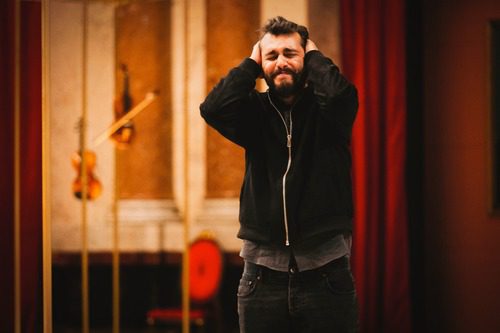
Darren Lynn Bousman: Here she is by the way.
PopHorror: Oh, you have the cello!
Darren Lynn Bousman: To me, I think in a different life I would have been in the music world, and I think I lived tangentially through the movies that I make in that world by making rock operas and musicals and all of that. Knowing that we were going to make a film that’s based on the idea of haunted or cursed music, I went to the most evil musician I know, which is Joe Bishara. We talked about it and some of my favorite movies. A lot of people say that music is like another character, but I think it’s more than that. Music is a backbone to me in a lot of my favorite films. When someone talks to me about the movie Suspiria, I don’t think about the crazy things in Suspiria, I think about Goblin. I think about that song from the original thing. When I go to Rosemary’s Baby, I think about the very haunting lullaby. Requiem for a Dream, it’s Clint Mansell’s score that I’m thinking about. There was a movie that Joe and I bonded off very, very early on called Irréversible, Gaspar Noé’s film. It is the most upsetting, anger inducing, gut wrenching…
PopHorror: That one is my favorite!
Darren Lynn Bousman: I watched it once in the theater and it was the only time I’ve ever been in the theater that I saw people leaving. Granted, horrible visions are taking place, but I watched it again recently, and realized that I had to look away. And I was equally disgusted looking away because of the drone, because of the sounds. This is funny. There’s this song that I use a lot in my movies from Irréversible and I rip it off. It’s called Rectum. That’s the name of the track. Google it after this, listen to the song called Rectum. It is the most upsetting series of noises you’ve ever heard, and music and intonation have the ability to unnerve you more than images do. I think that to me, what we wanted to do with The Cello is… I hate this, this is my douchey filmmaker part. I wish people could see the movie in a theater in 5.1 because the way that Urban Audio mixed the music and the way that Joe layered it, you are hearing things that are upsetting surrounding you. You won’t hear it on a laptop. It just gets crushed down. But there are noises and frequencies that we are using that just makes you upset and uneasy. We did a lot of time researching the frequency and the decibels that are mixed into the cello playing. And again, it sucks you won’t hear it on a laptop but in a 5.1 mix you will hear some of that stuff that I’ve taken from Gaspar Noé’s films. I just still think about that moment in the theater that made me uncomfortable. So that’s how we approached the music. We wanted it to feel like part of the story and not just an afterthought. The actor, Samer (Ismail), who was the lead actor Nasser in the film, did about a month of cello lessons. We also had a cellist on set with us everyday, and that cellist would sit under the camera so any time that you would see him playing, there’s a cellist right underneath it. His eyes are looking at that cellist to make sure that he’s mimicking and matching. Originally, we did shoot sequences with a master cellist with a green hood over his face, but I hate visual effects like that. I’m not going to put that actor’s face on it, so we kind of pushed him to do his best and we’ll edit in a way… I want you to be doing this, I don’t want someone else. He took the challenge and learned cello for a month and half.
Thank you so much to Darren for taking the time to speak with us. The Cello is in theaters now!
 PopHorror Let's Get Scared
PopHorror Let's Get Scared
